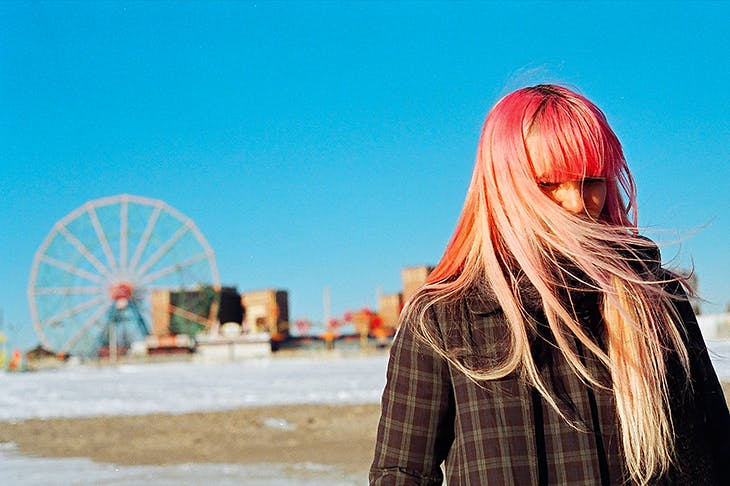Two films for you this week, one of which is surprisingly good and one of which does not surprise in the least. Shall we be unsurprised first?
OK, Another Mother’s Son, set during the second world war on Nazi-occupied Jersey, is based on the true story of Louisa Gould, who took in an escaped Russian PoW for the course of the war. Louisa Gold, what a mensch — she would later be named a ‘Hero of the Holocaust’. But it’s the kind of story that has been told countless times (I blame Anne Frank), and here it’s told in such a perfunctory, plodding way that it brings nothing new to the party. It’s simply as if an episode of Bergerac had developed ideas above its station — or a fancy for jackboots.
Jenny Seagrove plays Louisa, who has lost a son to the war, and seen how cruelly the Germans treat their Russian prisoners, so takes in Feodor (Julian Kostov), who is on the run. She calls him ‘Bill’, and also ‘my love’, which, I have to say, creeped me out, while he cleans up nicely, proves a wonder at languages — learns English overnight, seemingly — and those horrific wounds to his back, which she spots when he takes a bath on his first night? Never mentioned again although, heck, they would have to smart.
Judging from this, Louisa is not naturally gifted at hiding fugitives. It could even be said that she may be the worst hider of fugitives known to man. What a mensch and all that, but even so. Subject to Nazi searches at any time, she does not install Bill in an attic or cellar, but in a bedroom. Situated on an island known to house informants, she takes Bill shopping, to church, to the park. When the Nazis call it’s ‘quick, quick, Bill, hide in the chicken coop’, but then the next minute he’s serving in her shop, in full view. Most baffling. Seagrove does add some depth to Louisa — with her grief for her son; her Christian faith — but every other role is hopelessly underwritten, including her brother, Harold. He is played by Ronan Keating. From Boyzone. That is a surprise, I admit, but as Harold is so one-dimensional it’s impossible to say how Keating acquits himself. I will only mention that his accent does travel over the Irish Sea and back again a few times. Also, doesn’t this casting mean he has to be at least two decades younger than his sister?
As directed by Christopher Menaul, it gets us from A to B, but without much flair, or any complexity, and is therefore not surprisingly good, unlike All This Panic. This is a documentary, shot over three years, about a group of seven girlfriends in Brooklyn who start out at 15 or thereabouts and end up at college (or not). I know. Who wants to hang out with teenage girls? I’d have said I’d rather stay home and stick a fork in each eye. But, even at 79 minutes, it’s remarkably involving and touching, and as for Lena, I wanted her to come over so I could give her a hug. Still do. I would even put my forks down.
This has been made by Jenny Gage (director) and Tom Betterton (producer/cinematographer), a married couple otherwise known for their fashion photography. A series of intermittent vignettes, in effect, the film is quite fashion-y in its style: dreamy shots, shots that blur out of focus then become clear again. It’ll take you a while to get your eye in. Is that Ginger? Is that Dusty? Is that Olivia? At the outset they are, it’s true, narcissistically self-obsessed — boys, clothes, Facebook — but this’ll strike you as a fragile, transitionary period, and they’re also self-analytical: ‘People want to look at us but don’t want to hear what we have to say.’ I think that was Sage.
As we pop in and out of lives that are never trivialised, we encounter anger, sorrow, happiness, hope, disappointment and a number of scenarios such as how to deal with your friend who is drunk and vomiting at a party, how to come out as gay, how to find a sense of purpose. (Ginger, I hope you have.) And then there is Lena, who starts as a gamine, awkward waif, becomes a woman in front of our eyes, Boyhood-style, and is caught between longing for an escape from her deeply troubled family and knowing they depend on her. You will, I promise, be profoundly moved. And there you have it: a film to surprise and one that doesn’t. You can’t say I don’t cater for all tastes.
Got something to add? Join the discussion and comment below.
Get 10 issues for just $10
Subscribe to The Spectator Australia today for the next 10 magazine issues, plus full online access, for just $10.
You might disagree with half of it, but you’ll enjoy reading all of it. Try your first month for free, then just $2 a week for the remainder of your first year.














Comments
Don't miss out
Join the conversation with other Spectator Australia readers. Subscribe to leave a comment.
SUBSCRIBEAlready a subscriber? Log in